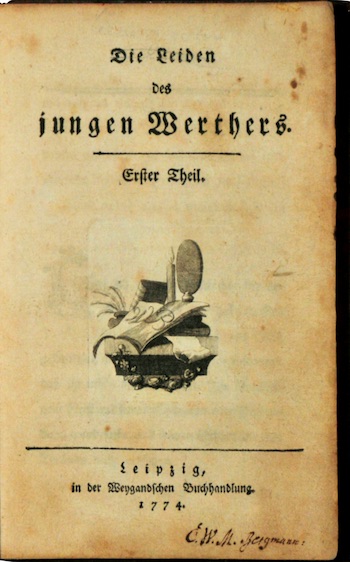The Sorrows of Young Werther by Goethe
What a thing is the heart of man!
Goethe, The Sorrows of Young Werther

The Sorrows of Young Werther – First Edition
In The Sorrows of Young Werther, Johann Wolfgang von Goethe opens a window into the soul of his young protagonist, allowing the reader to witness first hand his tragic destiny. Young Werther suffers from a hopeless love for the enchanting Charlotte who is engaged to an older man. In a series of letters to his friend Wilhelm, Werther reveals the depths of his anguish. The Sorrows of Young Werther is a beautifully told tale of the interior of a human heart in conflict.
First published in 1774, Goethe’s epistolary novel has many of the hallmarks of literary romanticism: unattainable love, a passionate and sensitive protagonist, feelings bared open to the world, and a deep appreciation for nature. In his book The Novel 100, Daniel Burt calls The Sorrows of Young Werther “One of the defining works of European Romanticism.”
Werther is a young artist who moves to the village of Walheim where he meets the lovely Charlotte, daughter of the local judge. Charlotte’s mother has died, leaving her to care for her brothers and sisters, and Werther becomes enamored of her, despite knowing that she is engaged to Albert, a man eleven years her senior. As he spends more time with Charlotte and Albert, Werther’s love for Charlotte increases, and so does his torment at knowing she is unattainable. The letters Werther writes to his friend Wilhelm express both the intensity of his love and the pain it causes him.
Goethe’s novel is beautifully written and groundbreaking in its portrayal of a human soul. German literary scholar Karl Viëtor writes about the novel’s significance:
Among European novels Werther is the first in which an inward life, a spiritual process and nothing else, is represented, and hence it is the first psychological novel….The scene is the soul of the hero. All events and figures are regarded only in the light of the significance they have for Werther’s emotion.
One thing that stands out in the novel is the likability of all of its characters. This is a novel with no clear antagonist, no evil villain. Not only is Charlotte beautiful, but she is also kind, charming, and generous. Albert is a good man who loves Charlotte. Werther himself is a passionate, sensitive young man whose feelings for Charlotte are pure and innocent. And yet there is conflict in the novel. The reader feels it almost from the very first page. What should Werther do about his passionate feelings for Charlotte? Ignore them? Act on them? Suppress them and move on? What should Charlotte do, and Albert?
These questions raise even deeper questions and invite the reader to reflect on his or her own beliefs about love and passion. What is love, and where does it come from? What is the role of emotion in relationships and what is the role of intellect?
The Sorrows of Young Werther is well worth a read, not only for its beautiful prose, but also for its attempt to grapple with issues of love and passion.
The Sorrows of Young Werther by Johann Wolfgang von Goethe
First edition Leipzig: Weygand’sche Buchhandlung, 1774
Kindle edition Open Road Media, 2015
Print length: 126 pages
































One of my “favorite” books. I’d never really thought about how there’s no *clear* protagonist though. I guess fate or circumstance is the villain, in that he is thrown into contact with a woman he can never attain. I read this over a couple weeks in the mornings before going in to work (I live on one side of the city and work on the other, so, to beat the heaviest traffic, would usually drive up extra early then just go to the coffee shop from 6:30 -7:30ish to get some reading in) I often arrived at the office in an unusually emotional (for me anyway) state. 🙂 Great post and summary of a great book!